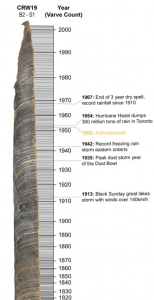 Contributed by Forest Stroud, Staff Geologist, PPM Consultants
Contributed by Forest Stroud, Staff Geologist, PPM Consultants
As an undergraduate student I remember my petrology professor mentioning the Anthropocene, or the age of humans. In his classic style he flopped one arm over the top of his balding head, leaned back in the old swivel chair he was sitting in, and allowed himself to bluntly chase a rabbit trail. He explained that some geologist saw a legitimate case for declaring a new Epoch in geologic time and that this was a point of contention in academic geologic circles. One side would argue we’re getting to hasty, another would say the human impact on the Earth is a geologic event, but not a new subdivision in time, and yet another would say that humans have made an impact on the geologic record significant enough to define a new geologic Epoch. Through the years the question of the Anthropocene has drifted into my thoughts, but when I read an article saying that scientist are getting closer to defining the Anthropocene it really made me want to chase the rabbit.
 I wanted to see for myself what the different arguments were for and against the Anthropocene and what part does the environmental field have as this new geologic consideration unfolds?
I wanted to see for myself what the different arguments were for and against the Anthropocene and what part does the environmental field have as this new geologic consideration unfolds?
When most people hear fossil record they conjure up images of dinosaurs and other extinct life. However, most fossils, and the sedimentary rock they are found in, are formed while being completely submerged in water. The fossilization process is a continual process that never really stops. Geologist in favor of designating a new geologic epoch point to the globalization of the fossil record spurred by the movement of people across the globe. Keep in mind this not only involves the migration of people, but also the impact of global shipping and logistics routes via boat, plane and train. This globalization has opened up the ability for species of plants to find where they have the least amount of competition. Those in favor of the Anthropocene argue that this globalization can be seen in microscopic sea dwelling creatures to domesticated plants and that this has shifted the paleontological record enough to justify a new epoch. Those opposed to the Anthropocene say this could qualify as a geologic event, but not justify a new epoch.
Francis McCarthy is a micropaleontologist at Brock University in St. Catherine’s Canada. She is also a member of the Anthropocene Working Group; a group of scientists attempting to codify the Anthropocene. McCarthy points to sediment layers in Crawford lake as the best evidence for the Anthropocene. In these layers she is able to see radioactive plutonium from nuclear weapons testing, the peak of the dust bowl, and even large abnormal rain storms. However, stratigraphers (professionals who study layers of rock) aren’t so quick to act. Whitney Autin asserts that one needs an undeniable hard rock layer to attach to a geologic new epoch. He refutes this by acknowledging that European agriculture has left signatures in the soil, but we don’t rush to claim that as a new epoch. Yes, radioactive plutonium from nuclear bomb testing is more dramatic, but a signature is a signature.
Whether we are in a new geologic epoch or not, it is largely agreed upon that the state of the environment is impacted by human progress and activity on the Earth. With growing environmental awareness the call to mitigate our impact on the Earth grows louder. This brings the opportunity for environmental consultants to partner with industry so that we can continue to see progress with industrial development, abundant energy, advancements in healthcare, transportation and everything in between. The progress should continue we just need to ensure that we are stewards of the environment along the way. The two can definitely co-exist and complement each other. If this of interest to you, below are some links to interesting articles on the Anthropocene. If you want to discuss it more feel free to reach out to me at forest.stroud@ppmco.com.
References:
What Is the Anthropocene and Are We in It? | Science| Smithsonian Magazine
Home | Anthropocene Curriculum (anthropocene-curriculum.org)
Working Group on the ‘Anthropocene’ | Subcommission on Quaternary Stratigraphy
Crawford Lake in Canada marks beginning of ‘Anthropocene,’ scientists say – The Washington Post

